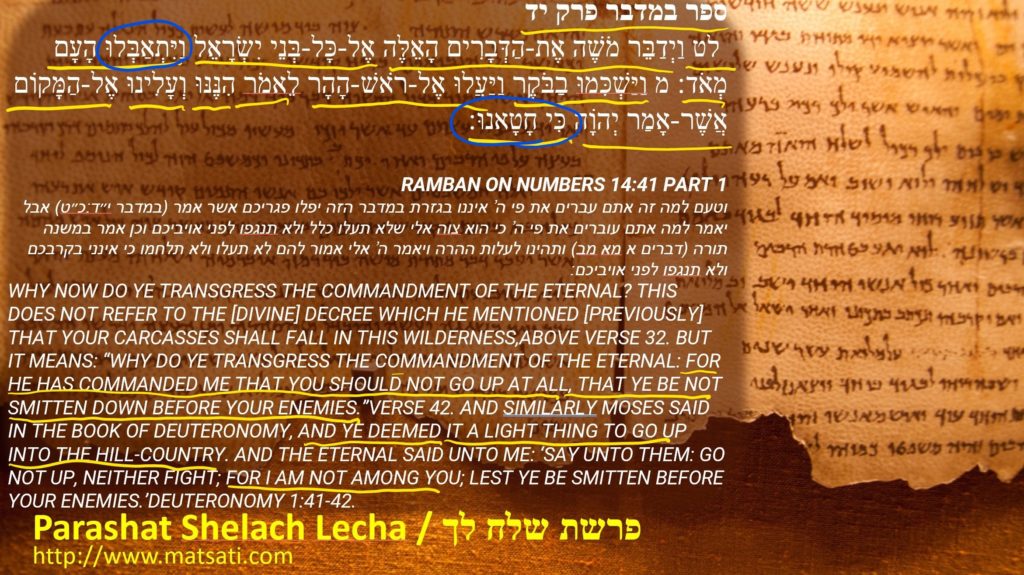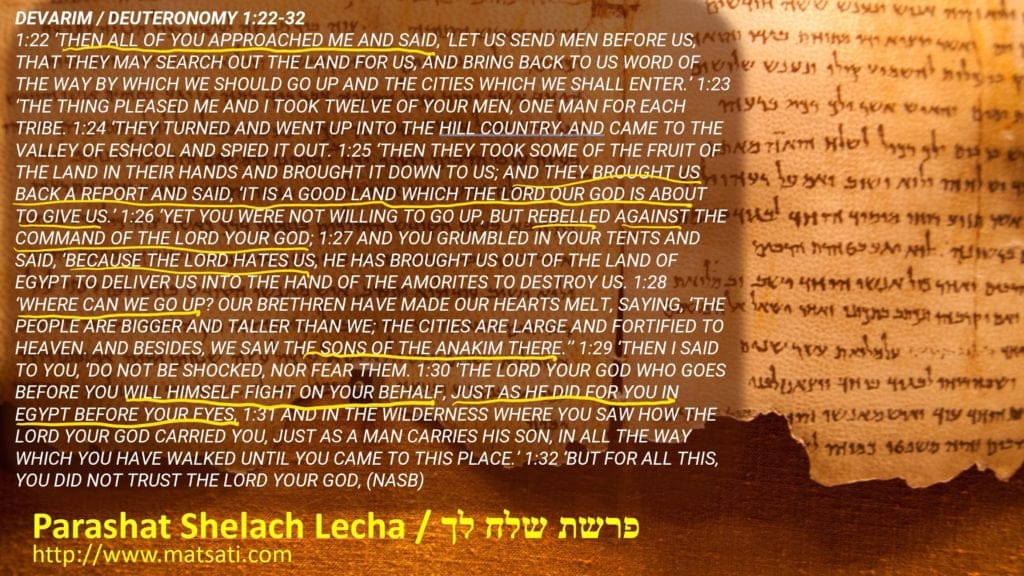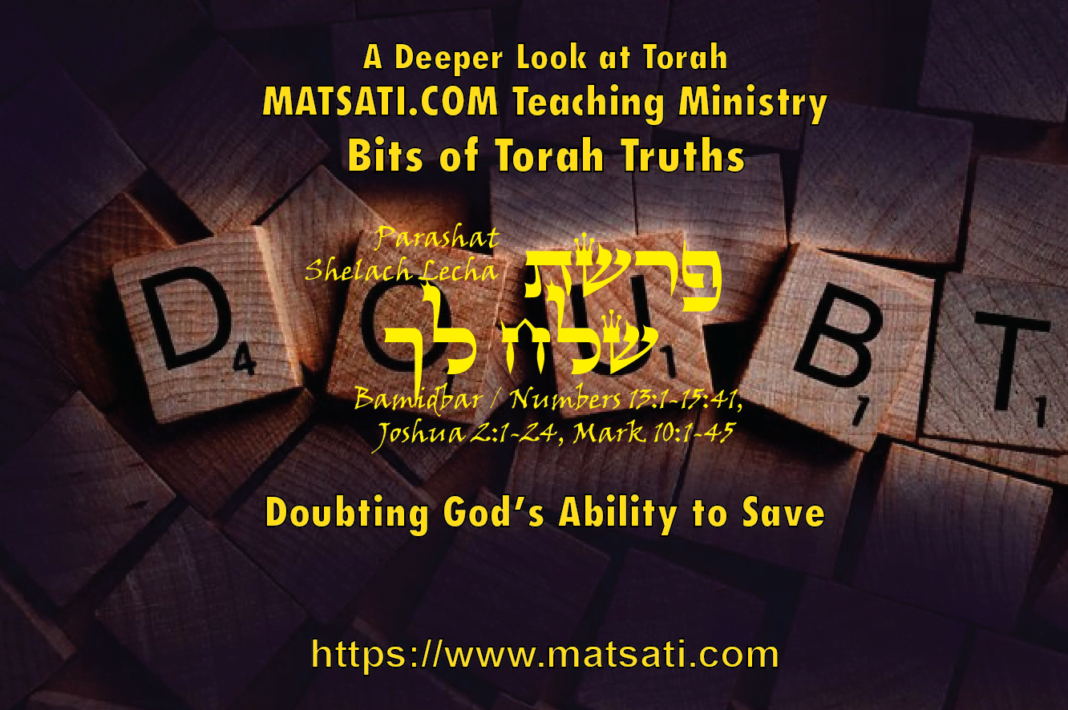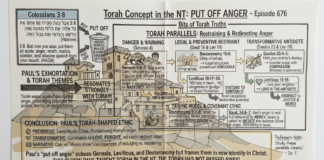In this week’s Torah Portion Parashat Shelach recounts the spies who went into the Promised Land (13:1-24),and the spies report on what they saw (13:25-33). Then we read how the people rebelled (14:1-12) and then Moshe interceding for the people (14:13-19),and the Lord promises judgment (14:20-38). The people rebelled and decided to go up to make war with the people and Israel was defeated (14:39-45). Moshe then gives the people the Khokim (חוקים, laws) on sacrifices (15:1-21), and the khok (חוק, law) about unintentional sin (15:22-31) and then we are told about what happens to a Shabbat breaker (15:32-36), then about tzitzit (15:37-41).
Following the spies giving a bad report and the people refusing to go into the land, and Moshe declaring the word of the Lord to the people due to their response, we read the following according to Bamidbar / Numbers 14:39-40, לט וַיְדַבֵּר מֹשֶׁה אֶת-הַדְּבָרִים הָאֵלֶּה אֶל-כָּל-בְּנֵי יִשְֹרָאֵל וַיִּתְאַבְּלוּ הָעָם מְאֹד: מ וַיַּשְׁכִּמוּ בַבֹּקֶר וַיַּעֲלוּ אֶל-רֹאשׁ-הָהָר לֵאמֹר הִנֶּנּוּ וְעָלִינוּ אֶל-הַמָּקוֹם אֲשֶׁר-אָמַר יְהוָֹה כִּי חָטָאנוּ: 14:39 When Moses told these words to all the people of Israel, the people mourned greatly. 14:40 And they rose early in the morning and went up to the heights of the hill country, saying, “Here we are. We will go up to the place that the Lord has promised, for we have sinned.” (ESV) So Moshe spoke to all the people and we are told the peoples response וַיִּתְאַבְּלוּ הָעָם מְאֹד “the people mourned greatly.” The issue is that having heard the answer from the Lord, they suddenly made a 180 degree turn in their decision after already having been decreed they would all die in the desert. The next morning they take it upon themselves to do the following, וַיַּשְׁכִּמוּ בַבֹּקֶר וַיַּעֲלוּ אֶל-רֹאשׁ-הָהָר לֵאמֹר הִנֶּנּוּ וְעָלִינוּ אֶל-הַמָּקוֹם אֲשֶׁר-אָמַר יְהוָֹה כִּי חָטָאנוּ they rose up an went to the top of the hill to do as God had commanded and it says כִּי חָטָאנוּ “because we have sinned.” Based upon their situation, it would be logical to believe they could correct the mistake by going up and doing as God had originally commanded. The people’s response to the majority report of the spies was to appoint a new leader to lead them back to Egypt. Notice the compounding of their sins. The first mistake was that the people thought they had God’s protection regardless of their sins. This is an indication of the importance of Teshuvah (Repentance). The people did not properly perform Teshuvah as taking matters into their own hand regardless of what God’s word says and taking matters into their own hands to make atonement through action. Moshe responds to the people saying, לָ֥מָּה זֶּ֛ה אַתֶּ֥ם עֹבְרִ֖ים אֶת־פִּ֣י יְהֹוָ֑ה וְהִ֖וא לֹ֥א תִצְלָֽח׃ “Why do you transgress the LORD’s command? This will not succeed.” Rambam has the following to say concerning these things:

Ramban on Numbers 14:41 Part 1
וטעם למה זה אתם עברים את פי ה’ איננו בגזרת במדבר הזה יפלו פגריכם אשר אמר (במדבר י״ד:כ״ט) אבל יאמר למה אתם עוברים את פי ה’ כי הוא צוה אלי שלא תעלו כלל ולא תנגפו לפני אויביכם וכן אמר במשנה תורה (דברים א מא מב) ותהינו לעלות ההרה ויאמר ה’ אלי אמור להם לא תעלו ולא תלחמו כי אינני בקרבכם ולא תנגפו לפני אויביכם:WHY NOW DO YE TRANSGRESS THE COMMANDMENT OF THE ETERNAL? This does not refer to the [Divine] decree which He mentioned [previously] that your carcasses shall fall in this wilderness,Above Verse 32. but it means: “Why do ye transgress the commandment of the Eternal: for He has commanded me that you should not go up at all, that ye be not smitten down before your enemies.”Verse 42. And similarly Moses said in the Book of Deuteronomy, And ye deemed it a light thing to go up into the hill-country. And the Eternal said unto me: ‘Say unto them: Go not up, neither fight; for I am not among you; lest ye be smitten before your enemies.’Deuteronomy 1:41-42.
We note what Rambam draws out from the text. He says that they chose to go up to fight when the Lord God Almighty was not among them due to their sins. This may be a common thing that occurs today, believing one may go through life in the power of God when sin reigns and prevalent and preeminent in one’s life. Moshe writes וְלֹא־יִהְיֶ֥ה יְהֹוָ֖ה עִמָּכֶֽם “the Lord will not be with you,” basically, these things will come upon your because you have turned from following the Lord (כִּֽי־עַל־כֵּ֤ן שַׁבְתֶּם֙ מֵאַחֲרֵ֣י יְהֹוָ֔ה). Going against the word of God to walk in our own ways will lead to walking out of the presence of God and directly into sin. In view of this, any attempt to invade that part of the land knowing that God was not in their midst was an act of rebellion as it reflected the fact that they relied on themselves rather than on God. These things reveal to us today how important it is to walk in God’s ways as opposed to our own ways by seeking His guidance and direction in life!
The verses we are looking at for this week are from Bamidbar / Numbers 14:39-45.
ספר במדבר פרק יד
לט וַיְדַבֵּר מֹשֶׁה אֶת-הַדְּבָרִים הָאֵלֶּה אֶל-כָּל-בְּנֵי יִשְֹרָאֵל וַיִּתְאַבְּלוּ הָעָם מְאֹד: מ וַיַּשְׁכִּמוּ בַבֹּקֶר וַיַּעֲלוּ אֶל-רֹאשׁ-הָהָר לֵאמֹר הִנֶּנּוּ וְעָלִינוּ אֶל-הַמָּקוֹם אֲשֶׁר-אָמַר יְהוָֹה כִּי חָטָאנוּ: מא וַיֹּאמֶר מֹשֶׁה לָמָּה זֶּה אַתֶּם עֹבְרִים אֶת-פִּי יְהוָֹה וְהִוא לֹא תִצְלָח: מב אַל-תַּעֲלוּ כִּי אֵין יְהוָֹה בְּקִרְבְּכֶם וְלֹא תִּנָּגְפוּ לִפְנֵי אֹיְבֵיכֶם: מג כִּי הָעֲמָלֵקִי וְהַכְּנַעֲנִי שָׁם לִפְנֵיכֶם וּנְפַלְתֶּם בֶּחָרֶב כִּי-עַל-כֵּן שַׁבְתֶּם מֵאַחֲרֵי יְהֹוָה וְלֹא-יִהְיֶה יְהוָֹה עִמָּכֶם: מד וַיַּעְפִּלוּ לַעֲלוֹת אֶל-רֹאשׁ הָהָר וַאֲרוֹן בְּרִית-יְהוָֹה וּמֹשֶׁה לֹא-מָשׁוּ מִקֶּרֶב הַמַּחֲנֶה: מה וַיֵּרֶד הָעֲמָלֵקִי וְהַכְּנַעֲנִי הַיֹּשֵׁב בָּהָר הַהוּא וַיַּכּוּם וַיַּכְּתוּם עַד-הַחָרְמָה:
Bamidbar / Numbers 14:39-45
14:39 When Moses told these words to all the people of Israel, the people mourned greatly. 14:40 And they rose early in the morning and went up to the heights of the hill country, saying, “Here we are. We will go up to the place that the Lord has promised, for we have sinned.” 14:41 But Moses said, “Why now are you transgressing the command of the Lord, when that will not succeed? 14:42 Do not go up, for the Lord is not among you, lest you be struck down before your enemies. 14:43 For there the Amalekites and the Canaanites are facing you, and you shall fall by the sword. Because you have turned back from following the Lord, the Lord will not be with you.” 14:44 But they presumed to go up to the heights of the hill country, although neither the ark of the covenant of the Lord nor Moses departed out of the camp. 14:45 Then the Amalekites and the Canaanites who lived in that hill country came down and defeated them and pursued them, even to Hormah. (ESV)
The people in their rebellion erred in their thinking that by their rebellion and rejection of God’s Word they could turn around and ascend the mountain and demonstrate their faith in God whereby they could somehow prove their new found faith by their own hands. Faith however doesn’t work like this. Faith is not an afterthought. Continuing to read the Torah, we read what Moshe says according to Devarim / Deuteronomy 1. Moshe tells us what really happened and how exactly everything took place in the book of Devarim / Deuteronomy.
ספר דברים פרק א
כב וַתִּקְרְבוּן אֵלַי כֻּלְּכֶם וַתֹּאמְרוּ נִשְׁלְחָה אֲנָשִׁים לְפָנֵינוּ וְיַחְפְּרוּ-לָנוּ אֶת-הָאָרֶץ וְיָשִׁבוּ אֹתָנוּ דָּבָר אֶת-הַדֶּרֶךְ אֲשֶׁר נַעֲלֶה-בָּהּ וְאֵת הֶעָרִים אֲשֶׁר נָבֹא אֲלֵיהֶן: כג וַיִּיטַב בְּעֵינַי הַדָּבָר וָאֶקַּח מִכֶּם שְׁנֵים עָשָֹר אֲנָשִׁים אִישׁ אֶחָד לַשָּׁבֶט: כד וַיִּפְנוּ וַיַּעֲלוּ הָהָרָה וַיָּבֹאוּ עַד-נַחַל אֶשְׁכֹּל וַיְרַגְּלוּ אֹתָהּ: כה וַיִּקְחוּ בְיָדָם מִפְּרִי הָאָרֶץ וַיּוֹרִדוּ אֵלֵינוּ וַיָּשִׁבוּ אֹתָנוּ דָבָר וַיֹּאמְרוּ טוֹבָה הָאָרֶץ אֲשֶׁר-יְהוָֹה אֱלֹהֵינוּ נֹתֵן לָנוּ: כו וְלֹא אֲבִיתֶם לַעֲלֹת וַתַּמְרוּ אֶת-פִּי יְהוָֹה אֱלֹהֵיכֶם: כז וַתֵּרָגְנוּ בְאָהֳלֵיכֶם וַתֹּאמְרוּ בְּשִֹנְאַת יְהוָֹה אֹתָנוּ הוֹצִיאָנוּ מֵאֶרֶץ מִצְרָיִם לָתֵת אֹתָנוּ בְּיַד הָאֱמֹרִי לְהַשְׁמִידֵנוּ: כח אָנָה | אֲנַחְנוּ עֹלִים אַחֵינוּ הֵמַסּוּ אֶת-לְבָבֵנוּ לֵאמֹר עַם גָּדוֹל וָרָם מִמֶּנּוּ עָרִים גְּדֹלֹת וּבְצוּרֹת בַּשָּׁמָיִם וְגַם-בְּנֵי עֲנָקִים רָאִינוּ שָׁם: כט וָאֹמַר אֲלֵכֶם לֹא-תַעַרְצוּן וְלֹא-תִירְאוּן מֵהֶם: ל יְהוָֹה אֱלֹהֵיכֶם הַהֹלֵךְ לִפְנֵיכֶם הוּא יִלָּחֵם לָכֶם כְּכֹל אֲשֶׁר עָשָֹה אִתְּכֶם בְּמִצְרַיִם לְעֵינֵיכֶם: לא וּבַמִּדְבָּר אֲשֶׁר רָאִיתָ אֲשֶׁר נְשָֹאֲךָ יְהוָֹה אֱלֹהֶיךָ כַּאֲשֶׁר יִשָּׂא-אִישׁ אֶת-בְּנוֹ בְּכָל-הַדֶּרֶךְ אֲשֶׁר הֲלַכְתֶּם עַד-בֹּאֲכֶם עַד-הַמָּקוֹם הַזֶּה: לב וּבַדָּבָר הַזֶּה אֵינְכֶם מַאֲמִינִם בַּיהוָֹה אֱלֹהֵיכֶם:

Devarim / Deuteronomy 1:22-32
1:22 ‘Then all of you approached me and said, ‘Let us send men before us, that they may search out the land for us, and bring back to us word of the way by which we should go up and the cities which we shall enter.’ 1:23 ‘The thing pleased me and I took twelve of your men, one man for each tribe. 1:24 ‘They turned and went up into the hill country, and came to the valley of Eshcol and spied it out. 1:25 ‘Then they took some of the fruit of the land in their hands and brought it down to us; and they brought us back a report and said, ‘It is a good land which the Lord our God is about to give us.’ 1:26 ‘Yet you were not willing to go up, but rebelled against the command of the Lord your God; 1:27 and you grumbled in your tents and said, ‘Because the Lord hates us, He has brought us out of the land of Egypt to deliver us into the hand of the Amorites to destroy us. 1:28 ‘Where can we go up? Our brethren have made our hearts melt, saying, ‘The people are bigger and taller than we; the cities are large and fortified to heaven. And besides, we saw the sons of the Anakim there.’’ 1:29 ‘Then I said to you, ‘Do not be shocked, nor fear them. 1:30 ‘The Lord your God who goes before you will Himself fight on your behalf, just as He did for you in Egypt before your eyes, 1:31 and in the wilderness where you saw how the Lord your God carried you, just as a man carries his son, in all the way which you have walked until you came to this place.’ 1:32 ‘But for all this, you did not trust the Lord your God, (NASB)
Notice what Devarim / Deuteronomy 1:22 states, it was the people who wanted to spy out the land, it was not Moshe. This provides us with a red flag of a sort concerning the people’s faith. Their response should have been “let’s go up to take the Land for the Lord is with us!” This is how Caleb and Joshua responded and is similar to what Moshe says in Devarim / Deuteronomy 1:29-32. Moshe shouldn’t have agreed as this showed some lack of faith in hindsight on behalf of the people. As we study the Scriptures, Israel’s history is a cycle of rebellion and restoration (Bamidbar / Numbers 14:18, see also Judges 2:10-19, Isaiah 59:13). Hashem gave Israel His Torah as a way of revealing to us how His people are to live out their Covenant relationship with Him. With the giving of the Torah, the Living word of God, men were given the freedom of choice whether to obey the Lord at His Word or not. This is the basics of the situation here as the people were about to enter the Promised Land. The people did not just rebel against trusting in the Lord, they rebelled against His right to be Lord over all. This is illustrated in the commands of God according to the Torah.
When we study the Torah we learn that over 40% of the 613 mitzvot (commandments) are concerning the חוקים (Laws) concerning sacrifice and their performance at the Mishkhan (Tabernacle). We also find חוקים concerning various social rules for establishing a system of justice through courts of law. There are commands also on the observance of the Shabbat and the Shalosh Regalim (Passover, Shavuot, Sukkot) as well as purity laws concerning “clean and unclean” and matters related to family life. In the five books of Moshe, there are commands concerning adultery, all types of sexual sin, murder, slavery, attaining inheritance, Levirate marriage, intermarriage with non-Jews, Nazirite vows, and so on. In addition, the Torah also includes many agricultural חוקים that are related to farming practices such as the שְׁמִטָּה (Shemittah, to release), בִּכּוּרִ֤ים (Bikkurim, first fruits), לֶקֶט (Leket, provision for poor), שכחת (shechet, forgotten produce) and פֵאָה (peah, corners for the poor to glean);. There are also other חוקים that apply to bond-servants and permanent slaves, including debt cancellation. Then there are also criminal חוקים regarding punitive justice, making restitution for theft, civil cases, etc. The Torah also includes חוקים regarding destroying idols, for warfare against pagan nations, for capital punishment, and for how the testimony is to be based upon two or more witnesses. There were also חוקים concerning Spiritual, ethical, and moral laws, too. These חוקים included the duty to love the LORD with all your being, and to love your neighbor as yourself. (Devarim / Deuteronomy 6:4-10) We note how these things describe how God’s word is really all pervasive and governs all areas of our lives. This is what these people were rebelling against, God’s all encompassing presence, the very Gospel Message that was being taught to the people in the wilderness about His presence in our lives.
When we read John chapter 1,we learn Yeshua is the Living Word of God become flesh (John 1:14). This is why Yeshua is the embodiment of the Torah, the “living Torah,” which means that He is the expression and will of God. The Messiah is the true Lawgiver of Israel, he also expects his people to use their heads and to think through matters carefully before rendering their judgments (see John 7:24). This is how the people erred in their thinking that faith can work as an afterthought as they were taking a relationship with the God of Israel as only optional. Is it possible at times we too sometimes think like that? When considering the idea of thinking things through before making our decisions and judgments, this is the reason Moshe instructed to establish an elaborate legal system with judges, courts, and a supreme court (Sanhedrin) to adjudicate questions of the law (see Shemot / Exodus 18:13-26, Bamidbar / Numbers 11:24-29, Devarim / Deuteronomy 16:18-20 and 17:8-12). Considering what we are learning here this week, we as God’s people are basically instructed to use our minds, to reason logically, ethically, and morally, and to trust in the Lord! We can derive these things for how Moshe functioned in the Torah. Moshe saw the image on the mountain, and he had to reason how one might construct an earthly copy pertaining to the Mishkhan, the furnishings, the altar, the ark of the covenant, etc. Moshe had to use reason, deduction, and discussion concerning the intent, purpose, and Revelation given to him upon the mountain. This was what is so different about God’s word and His request to be a part of our lives, that the Torah itself requires us to interpret its meaning and to discern the intent of the command and how to live it out (see Vayikra / Leviticus 19:15, Devarim / Deuteronomy 1:16 and 16:18).
Fortunately for us we have centuries of literature detailing the discussions and rulings concerning how to live out the commands. Even more importantly, we have Yeshua who also showed us how to live out God’s Torah in mercy and Love for the sake of healing and caring for others. He explained the Torah from the perspective of the inwardness of impurity because of sin. This is what Paul was explaining in Romans of the Torah God’s holy and righteous word and the power of sin in the body. The things of the Spirit are at war with the body. Yeshua does what the law of Moses cannot do, specifically, Yeshua is able to deliver men, women, and children from the power of sin and death. The Torah was powerless to change the inward condition. This is one of the things Paul talked about more than anything else! The change of inward condition requires an act of God, a miracle of healing and purification of our hearts and minds. This is the very real power and presence of God in our lives. Today we can expect a miracle in our lives and that miracle is through faith in Yeshua and receiving power from on high through the presence of God by His Spirit dwelling in our hearts setting us free from Slavery to sin!









